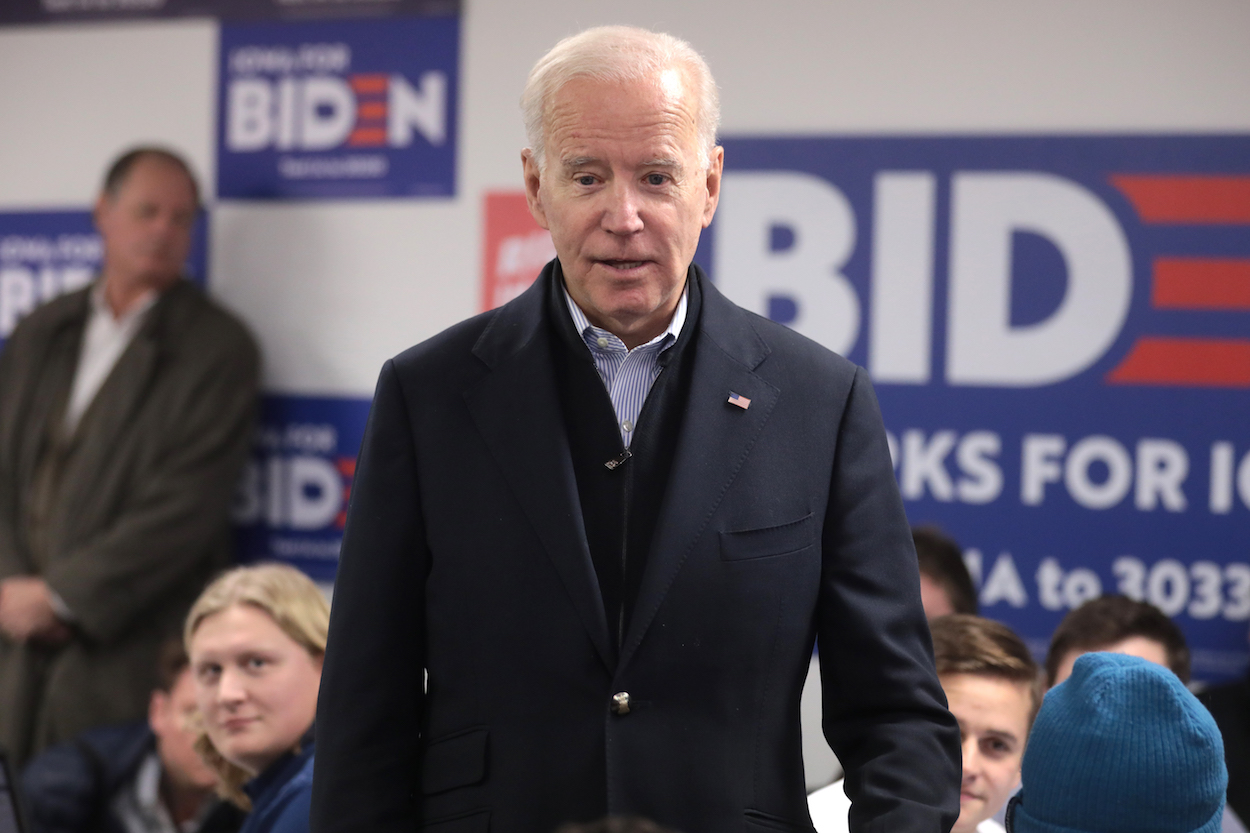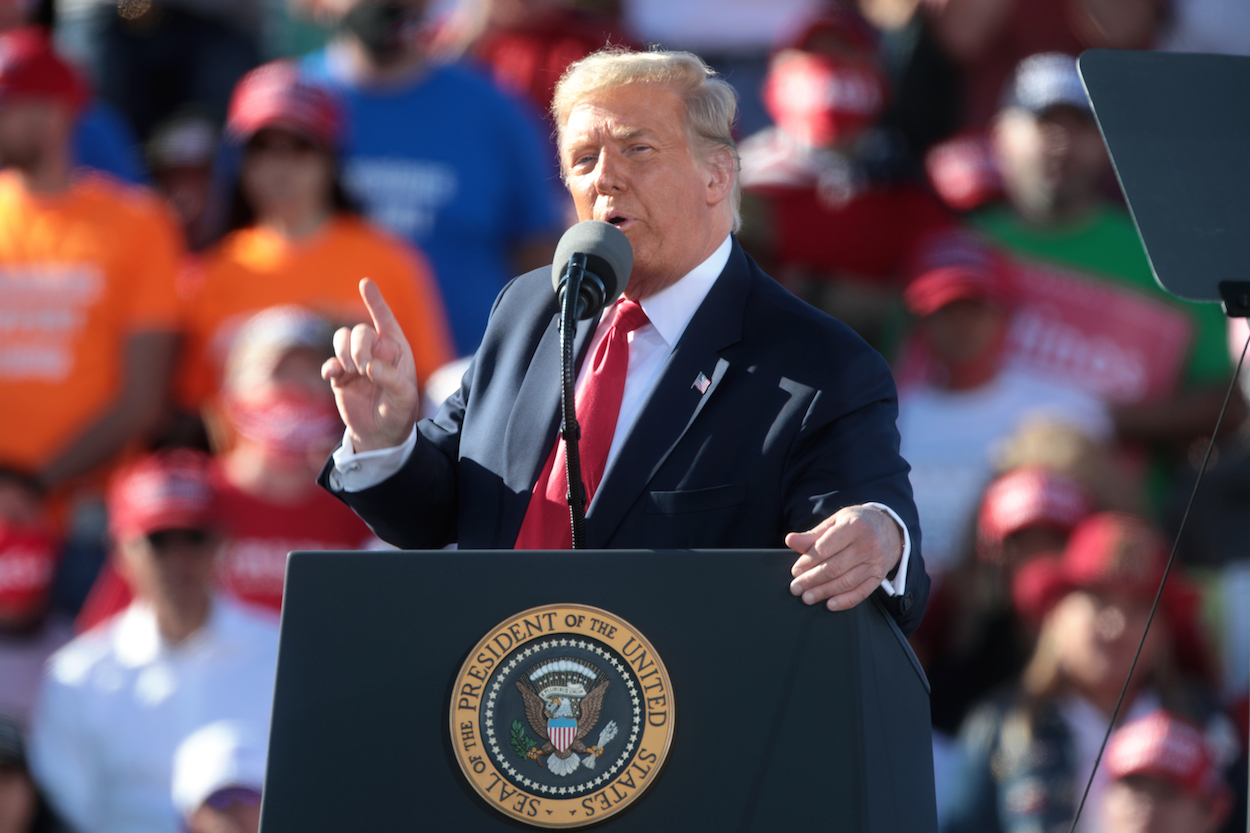by Brian Hioe
語言:
English
Photo Credit: Gage Skidmore/Flickr/CC
JOE BIDEN HAS won the 2020 US presidential election, defeating Donald Trump after winning Pennsylvania, and obtaining the needed 270 electoral votes to win the election.
Despite paths to election victory seeming to be increasingly narrow for Biden on election night, the “Blue Wall” strategy embraced by the Biden campaign eventually came to fruition, after Biden won key battleground states as Illinois, Michigan, Minnesota, and Wisconsin. Though early during election night, some speculated as to a scenario in which Biden won the electoral vote but Trump won the popular vote, after several days of vote counting, Biden led Trump by over four million votes, with 75,196,516 votes to 70,803,881 votes.
 President-elect Joe Biden. Photo credit: Gage Skidmore/Flickr/CC
President-elect Joe Biden. Photo credit: Gage Skidmore/Flickr/CC
That being said, it is probable that Trump will try to overturn the results of the election through a legal challenge. Trump prematurely declared victory at 3 AM EST on election night, alleging voter fraud, and has appeared on media several times after to call for vote counting to be stopped. So Trump is likely to challenge his loss. It had previously been reported that Trump could potentially embrace the strategy of a legal challenge to his election loss, using the current Republican majority in the Supreme Court to try and secure a ruling in his favor.
While the Biden campaign hoped that voting would result in a clear lead that would prevent Trump from doing this, Biden did not emerge with enough of an early lead that would have prevented such a challenge to the legitimacy of the election.
As such, one expects contestation regarding the American election to continue, possibly going on for weeks until there is a final outcome that prevents challenges. Trump refused to commit to a peaceful transition of power before the election and it is thought that Trump may call on right-wing militias that back him. Protests by Trump supporters calling for absentee and mail-in ballots not to be counted have already broken out, with protesters seeking to physically stop votes from being counted. The US may see weeks of civil unrest yet.
Likewise, that Trump was able to win close to 68 million votes in spite of his mishandling of the COVID-19 pandemic and mismanagement of the American government is indicative that the right-wing political turn of America is here to stay—with election results indicating that Trump has actually gained ground among minority voters.
While the Democrats control the House of Representatives, current results for the Senate are dead even between both parties, and the Democratic “Blue Wave” repudiating the actions of the Republican Party over the past four years did not come to fruition. The turbulence of the election will likely be another blow to America’s international credibility, then, following four years of Trump. That being said, Fox News and some Republican politicians, such as Mitt Romney, distanced themselves after Trump’s comments calling for an end to vote counting, claiming to view this as having crossed the line, but likely hoping to strategically cut ties with Trump to limit fallout to their own political careers. Though Trumpism is here to stay, not all Republican politicians will want to politically affiliate themselves with the brand of politics he pioneered.
In the meantime, Taiwan will now have to reckon with the realities of a Biden presidency. Although the election was a close one, a Biden victory was predicted by most pollsters beforehand—yet many in Taiwan seemed to be convinced that a Trump reelection victory was all but certain.
 American president Donald Trump. Photo credit: Gage Skidmore/Flickr/CC
American president Donald Trump. Photo credit: Gage Skidmore/Flickr/CC
Anxieties are likely to reemerge that a Biden administration will see a reversal of course for the gains for Taiwan under the Trump administration among the general public. In particular, there is a historical wariness of Democrats in Taiwan, with the belief that Republicans are more strongly supportive of Taiwan. To begin with, historically speaking, the change in America’s diplomatic recognition from the ROC to the PRC occurred under the Carter administration, and China’s entrance to the WTO took place under the Clinton administration—both Democratic presidential administrations.
But much blame in particular is directed at the Obama administration, seeing as the Obama administration tried to sabotage Tsai Ing-wen’s election chances in 2012 with public comments that it questioned whether Tsai would be a provocateur of cross-strait relations. The Obama administration also nixed arms sales to Taiwan for fear of displeasing China. Consequently, distrust of Biden in part stems from his being Obama’s vice president.
Indeed, one notes that Taiwan is increasingly a bipartisan issue in the US, that arms sales to Taiwan have taken place under both Democratic and Republican presidential administrations, and that even if legislation supportive of Taiwan is more frequently proposed by Republicans, it is often bipartisan. However, this scarcely registers in Taiwan, with Republicans primarily credited for actions supportive of Taiwan. There was perhaps no more telling incident of this than a clip shown at Tsai’s presidential inauguration featuring clips of international politicians congratulating Tsai on her reelection victory—clips of Democratic politicians were shortened to give Republican politicians more airtime. Particularly in the wake of an article in the Washington Post calling attention to the Tsai administration’s banking on a Trump reelection, there has been increased calls in Taiwan for the Tsai administration to seek to build stronger ties with the Democratic Party—even the KMT has taken to criticizing the Tsai administration on the matter.
Though many experts have taken the view that tensions between the US and China under Biden will continue, among the general public in Taiwan, many fear that the Biden campaign was simply playing up the China issue in order to outdo Trump and that he will drop the issue once president. Comments by Biden previously dismissing China as a potential competitor of the US had provoked alarm. But, that being said, early verdicts on Biden in Taiwan will likely reverse course if he does, in fact, take a strong stance on China, much as panic regarding a Trump presidency rapidly abated after the December 2016 Trump-Tsai phone call.
Indeed, structural factors likely dictate continued confrontation between the US and China, but Biden is more likely to take a more multilateral approach to confronting China than Trump did, hoping to reestablish alliances called into question by Trump tto contain China’s rise. This would include trying to coordinate with the European Union, Japan, and other regional powers to counter China.
Biden’s foreign policy will likely be shaped by his experiences as a politician that came of age during the Cold War and the system of alliances built by the US to contain the Soviet Union. The “new Cold War” framework is probably here to stay. What specific measures this will entail is still unknown. A Biden administration may seek to re-join the Trans-Pacific Partnership, which later became the Comprehensive and Progressive Agreement for Trans-Pacific Partnership after the Trump administration withdrew America from it, in line with its protectionist concerns.
 Taiwanese president Tsai Ing-wen (center). Photo credit: Tsai Ing-wen/Facebook
Taiwanese president Tsai Ing-wen (center). Photo credit: Tsai Ing-wen/Facebook
It is more opaque as to whether Biden will inherit Trump’s specific diplomatic playbook regarding China or not, particularly regarding the US-China trade war. For example, it is a question whether Biden will or will not lift tariffs imposed by Trump on China. Although Biden is hardly the protectionist Trump is, some speculate that the Biden administration will maintain tariffs as an effective measure of pressuring China. Biden will likely also continue to pressure China regarding IP protections, though some have framed Biden’s foreign policy as more interesting in pressuring China on the technology war and economic competition between the US and China than geopolitical issues such as those regarding the South China Seas and other potential hotspots.
However, while continued confrontation with China under Biden is likely, it is more of a question what stance the US will take vis-a-vis Taiwan. More confrontational policy against China does not necessarily entail support for Taiwan, with Taiwan possibly being left out of a strategic alliance aimed at containing China.
Notably, the announcement of arms sales on the day of the election was likely a move aimed at reassuring Taiwan and sending a signal to China regarding the stability of US-Taiwan ties irrespective of a possible transition of power in American electoral politics. But Taiwan will need reassurance from the Biden administration nonetheless. If the Biden administration retains some of the measures taken by the Trump administration against China, it may also retain some of the Trump’s administration loosening of regulations on arms sales to Taiwan, such as regarding drone sales.
It has also been speculated as to whether Biden would accept a telephone call from Tsai, in line with the Trump-Tsai phone call, using this as setting a precedent for communications between the American and Taiwanese presidents. If this idea came to fruition, this would be another example of the Biden administration carrying on diplomatic measures originally from the Trump administration.
To this extent, while Trump was known to have contemplated using Taiwan as a bargaining chip in negotiations with China under a trade deal, this is less likely to take place with Biden. In order to maintain trust among American allies facing the threat of China, Biden would likely wish to avoid the damage to America’s credibility among its allies if it were to rapidly discard Taiwan in such a manner.
Yet, as with the Obama administration’s actions toward Tsai during her 2012 election bid, if international perception of Tsai or any other pan-Green Taiwanese leader were to shift in a direction that they are perceived as a provocateur of cross-strait relations, Taiwan still stands to be rapidly thrown under the bus by America. This, then, may be what Tsai may need to be most cautious of under a Biden administration, as it would need to be careful of under any American presidential administration.

